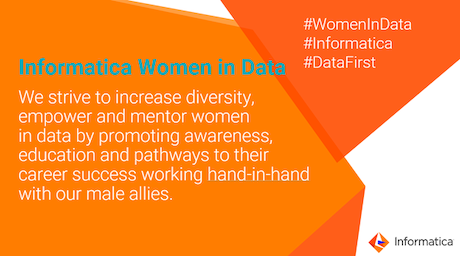Women in Data Leading With Empathy

The past year has forced organizations around the world to adapt to new ways of working. Women in particular have been disproportionately affected by these changes. According to the 2020 Women in the Workplace study sponsored by McKinsey & Company and Lean In, one in four women are contemplating what many would have considered unthinkable less than a year ago: downshifting their careers or leaving the workforce. But, the report goes on to say, if companies make significant investments in building a more flexible and empathetic workplace, they can retain the employees most impacted by today’s crises and create more opportunities for women to succeed in the long term.
Empathy was a central topic at the Informatica Women in Data Leadership Forum I hosted last week, where I was joined by a panel of leaders from FIS, Baker Hughes, and Microsoft. Together, we explored how they and their teams are navigating the new reality and how a data-driven approach is helping to move their businesses forward. Our panelists also shared how they’re using data to drive business value, why it’s important to tie data to growth, and how they’re building a diverse workforce at their organizations. Here are some highlights from our discussion.

Building Resiliency Across Teams
Being data-driven was innovative pre-pandemic, said panelist Eve Stacey, VP, GTM US Partner Group at Microsoft. But now over half of the GDP globally transacts digitally. Just to survive the pandemic we’ve had to shift to digital, but now companies realize it’s key to overall productivity. If you’re data driven, you can get to the truth, especially if your data is validated and high quality. Resilience is just as true for managing teams as it is for datasets – relentlessly pursue quality data so you can focus on what matters. Empathy and vulnerability are critical in our lives and in our workforce, she emphasized.
We’re strong as individuals but much stronger together, agreed panelist Libby Pachan, VP Data Analytics at Baker Hughes. Communication and empathy have been crucial to the transformation of all organizations, whether for emotional support or professional guidance. Alexis Suer, Global Data Governance Leader at FIS, shared how she’s developed approaches to help prevent burnout on her team. She encourages people to step away when they need to, acknowledging that with everyone on her team working remotely, work gets done at a much faster pace.
Embracing a Data-First Strategy
Alexis, who sits in the Chief Growth Office at FIS, also emphasized the importance of using data governance as an accelerator for revenue and as a risk mitigator to protect revenue. By aligning with the strategic goals of the corporation, you can influence how data is used and get to exception-based governance models.
Eve concurred that tying data to the growth office elevates it to a board level, noting that companies that embrace a data-first strategy have been shown to have a four-fold improvement in revenue. Libby stressed the importance of having a data strategy with AI objectives that support business goals, and the need to be proactive in managing data truly as an asset. Baker Hughes does have instances of data governance, she noted, but they need to bring it across the enterprise, as the company enters new markets and creates new business and service offerings.
At FIS, data governance doesn’t always adhere to a federated model, Alexis said; it’s not an all-or-nothing approach. It can be pocketed with the maturity of various groups and organizations.
Focusing on Diversity
All three panelists acknowledged the need to increase diversity across their teams and their organizations. If you look back over 200 years, Eve noted, we have a lot to make up for, and we won’t have a level playing field until we have a lot more diversity. Microsoft does a lot of diversity training and requires that you have at least two diverse candidates when interviewing, as well as diverse interviewers.
Historically, the banking industry has some work to do, Alexis pointed out. Women aren’t yet represented in the leadership teams in a way that she expects. FIS just started a Women in Data group, a warm place where women can come and learn as data professionals. She actively seeks out diverse candidates for her team as well. Baker Hughes also has an intense focus on diversity, Libby shared, with very influential and strong leaders, such as having a woman as the CIO who serves as a great role model throughout the organization. They’ve also started an initiative, Women Connect, where colleagues can provide advice and guidance but also care for, support, and help one another.
Paying It Forward
As our discussion came to an end, I asked our participants to share one key piece of advice. Stay humble, Libby advocated. There is no one way or strategy, so you should have an aptitude for change. And second, stay curious: in data, the landscape is rapidly changing, so you should never stop learning.
Never give up, Eve proclaimed, noting that a friend gave her a bracelet with that inscription. No matter where you are in your career, it’s true in your life and in your business relationships. Take a new approach to go after what you want to achieve.
Have an outward focus, Alexis advised. Offer the mike when there’s an opportunity to give the next generation of women leaders a voice. And remind women that we can do the hard things.
Next Steps
Join us for Informatica World 2021 April 13–15, where you will hear from leaders like Reshma Saujani, founder and CEO of Girls Who Code, and Tembi Sibanda, Director of Enterprise Data at Peloton. Register now.








